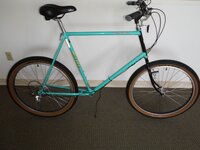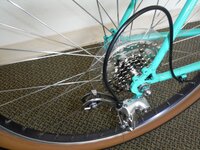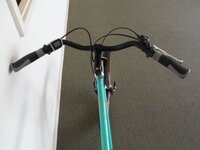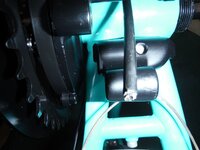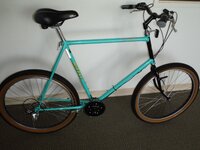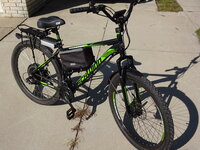I was just a my local bicycle shop to purchase some gear. So i got to talking with one of the sales person, i said i was thinking of converting my Barracuda Mountain bike to Bafang conversion kit. He said he never heard of that company and furthermore they don't recommend converting. His reasoning was that those conventional bikes were not built to handle the weight and wear and tear that a new ebike could handle, it will start to fall apart. so i was thinking naturally that's there opinion because the want to sell you a bike! or is what he said true and it will be a wast of money!!!! What say you, I would like to get some opinions/ advice
You are using an out of date browser. It may not display this or other websites correctly.
You should upgrade or use an alternative browser.
You should upgrade or use an alternative browser.
Can a conventional mountain handle conversion kits
- Thread starter rcooch
- Start date
Gionnirocket
Well-Known Member
- Region
- USA
- City
- Y. O.
It really comes down to how hard are you going to ride it and what your expectations are. At this point I'm an old man just riding for exercise with and occasional detour onto very tame trails. I converted my 12 year old budget fsmtb (Kent) 18months ago and have had relatively no problems with the bike or motor. Just changed my chain this morning for the second time and averaging about 3000mi. with the standard kmc 8.1 The bike itself is a bit of a tank weighing in at about 40lbs before the motor add and with an upgraded budget air fork and shock.
Last edited:
RunForTheHills
Well-Known Member
- Region
- USA
Well, a mid-drive motor will wear out the chains, chainring, and rear cassette faster than just leg power for sure. That is a compromise many people are willing to make if they need the help of a motor to get over the hills they ride. Thousands of people have installed Bafang kits on conventional bikes. They work. If you aren't carrying a lot of extra weight or climbing very long steep hills that require a mid-drive motor, a hub drive motor kit would not cause the extra wear and tear on the drive train and work just as well on flat terrain and mild to midgrade hills.
theemartymac
Well-Known Member
I'd also suggest that a really cheap bike shouldn't be converted. More hassle than it's worth, and cheap brakes and drivetrains components will reveal themselves quickly.
But, if you have a solid quality and good condition MTB with mid-range or higher brand name parts, go for it. That's the ideal target for kits like the BBS02. You don't need to over power them either, and 350-500w kits with batteries below 14ah can really be sweet on a lighter bike frame with a smaller/typical fit rider.
If you want to make a speed monster with 750w or more of power, 25+mph speeds, and perhaps some off-road use, you will want a pretty decent quality bike with possibly hydraulic brakes and e-bike rated tires. It's easy for a 200lb man with a large 17ah battery and BBSHD conversion kit to approach 300lbs with just a little cargo, and most traditional (non-e-rated) bicycle hubs and components are really designed for total loads below 250lbs.
But, if you have a solid quality and good condition MTB with mid-range or higher brand name parts, go for it. That's the ideal target for kits like the BBS02. You don't need to over power them either, and 350-500w kits with batteries below 14ah can really be sweet on a lighter bike frame with a smaller/typical fit rider.
If you want to make a speed monster with 750w or more of power, 25+mph speeds, and perhaps some off-road use, you will want a pretty decent quality bike with possibly hydraulic brakes and e-bike rated tires. It's easy for a 200lb man with a large 17ah battery and BBSHD conversion kit to approach 300lbs with just a little cargo, and most traditional (non-e-rated) bicycle hubs and components are really designed for total loads below 250lbs.
tomjasz
Well-Known Member
- Region
- USA
- City
- Minnesnowta
Too funny, he never heard of the arguably most recognized mid drive kit maker?
I've watched hundreds of conversion customers convert their BRAND NAME $600 plus acoustic bikes.
I think most $600 plus bikes are great candidates. Older bikes are a good idea as well. @PedalUma
Looking at Electra and other flat foot frames, many are available as eBikes and I see ZERO difference in the acoustic frame compared to the powered versions.
What Ido find terrifying are the rocket scientists converting a $250 Walfart fat bike. And riding at speeds above class 3.
30MPH+
I've watched hundreds of conversion customers convert their BRAND NAME $600 plus acoustic bikes.
I think most $600 plus bikes are great candidates. Older bikes are a good idea as well. @PedalUma
Looking at Electra and other flat foot frames, many are available as eBikes and I see ZERO difference in the acoustic frame compared to the powered versions.
What Ido find terrifying are the rocket scientists converting a $250 Walfart fat bike. And riding at speeds above class 3.
30MPH+
PedalUma
Well-Known Member
- Region
- USA
- City
- Petaluma, CA
The price of the bike does not matter. You do want things like decent wheels, bearings and cassette. I do used bikes all the time. This is a 1983 bike that I am converting today. It will be a Class 3 bike by Sunday morning. The owner is 6'6" and loves his High School sweetheart bike and just wants to upgrade it without changing its character. The zip tie is temporary until I get the rear brake and motor in.
Attachments
I do consider my bike not a high-end but not a clunker it’s a barracuda A2R Shimano STX gears in fact I think all the parts of ShimanoWell, a mid-drive motor will wear out the chains, chainring, and rear cassette faster than just leg power for sure. That is a compromise many people are willing to make if they need the help of a motor to get over the hills they ride. Thousands of people have installed Bafang kits on conventional bikes. They work. If you aren't carrying a lot of extra weight or climbing very long steep hills that require a mid-drive motor, a hub drive motor kit would not cause the extra wear and tear on the drive train and work just as well on flat terrain and mild to midgrade hills.
My bike is a Barracuda A2R it is an old bike about 25 years old but in excellent condition all Shimano parts That’s what I think it’s a good candidate to confirm what do you thinkWell, a mid-drive motor will wear out the chains, chainring, and rear cassette faster than just leg power for sure. That is a compromise many people are willing to make if they need the help of a motor to get over the hills they ride. Thousands of people have installed Bafang kits on conventional bikes. They work. If you aren't carrying a lot of extra weight or climbing very long steep hills that require a mid-drive motor, a hub drive motor kit would not cause the extra wear and tear on the drive train and work just as well on flat terrain and mild to midgrade hills.
theemartymac
Well-Known Member
This one?My bike is a Barracuda A2R it is an old bike about 25 years old but in excellent condition all Shimano parts That’s what I think it’s a good candidate to confirm what do you think
If so, you're fine at mild to moderate power. It's a standard mid-range bike with 73mm bottom bracket, and nothing too unique to challenge you. Externally routed cables and standard parts. Should allow for a nice clean build.
Last edited:
tomjasz
Well-Known Member
- Region
- USA
- City
- Minnesnowta
Kinda sorta! I find major brands in the $600 and above prices have good enough braking and are good candidates for kits. IMO and IME older hardtail bikes are great candidates. You've shown us that in many posts. Good on you!The price of the bike does not matter.
PedalUma
Well-Known Member
- Region
- USA
- City
- Petaluma, CA
Slightly off topic: This is very bad. On that teal bike the rear brakes' cables on the chain stays are in conflict with the secondary motor mount. I learn best by screwing up. I just found out while fitting the motor.
Attachments
Gionnirocket
Well-Known Member
- Region
- USA
- City
- Y. O.
It's obvious the guy in the bike shop is nothing more than ignorant, obtuse d_bag.First and foremost, he said the bikes are not made for extra weight and whatnot, but was he an engineer? or just a guy who works at bike shop, if that's the case, what does he
Just about any bike can be converted and it depends more on what type of kit you decide to use and how it's riden.
Obviously if you take the cheapest bike possible and install the most powerful motor and ride the s*it out of it.. it will fail. But conversely if you take an entry level bicycle and install a modest motor and just use the motor to make up for the strength and stamina you've lost as you've aged, it can be very reliable and last just as long as if no conversion was done.
The idea that a certain level of cost must be adhered to is the same bs bike shops and enthusiasts have been spewing for decades...ebike or not.
AHicks
Well-Known Member
- Region
- USA
- City
- Snow Bird - Summer S.E. Michigan, Winter Gulf Coast North Central Fl.
First conversion I did was a new 29" Schwinn mountain bike from Walmart, purchased for about 200. I bought it because it had disk brakes. Turned out to be a pretty nice bike. I rode it for a year, sold it for nearly what I had into it (too tall for this old man!), and I still see the guy that bought it riding on occasion 5 years later!
Attachments
harryS
Well-Known Member
Wow. The legendary Myyata puts its rear brakes down by the kick stand position? Is there a plate on the upper chainstays for the brakes?.Slightly off topic: This is very bad. On that teal bike the rear brakes' cables on the chain stays are in conflict with the secondary motor mount. I learn best by screwing up. I just found out while fitting the motor.
harryS
Well-Known Member
My bike is a Barracuda A2R it is an old bike about 25 years old but in excellent condition all Shimano parts That’s what I think it’s a good candidate to confirm what do you think
Sure, I looked at some pics. It should be a good candidate for a Bafang BBS02. If you want the security of a front disk brake, you'll have to replace the fork with one that has the tabs. It's probably a a 1" threaded fork. Any 1" fork, threaded or threadless, with tabs is hard to find these days. EIther, there is a surge in DIY conversions of old bikes, or the supply chain just dried up.
I converted a 1992 Trek (rear motor) seven years ago, and 1" threaded suspensions forks were easy to find,. I further had to convert to threadless, but the steerer was long enough to do so. Now those forks are out of stock everywhere, By the way, even I upgraded to a wheel that could take disk brakes, I thought the Trek. upgraded to v-brakes, had plenty of stopping power. I did put a disk brake up front on my BBS02 conversion later, but the main difference is that it's harder to keep in adjustment.
Last edited:
I think his opinion is in the hopes that I would buy a bike from him I think that’s why they steer you away from the conversionsI don't know but I'm just wondering why the sales person was recommending against the conversions.
What particular part(s) was his concern?
Because as we know, ebikes are basically bicycles, you can get many replacement parts from bike shops.
First and foremost, he said the bikes are not made for extra weight and whatnot, but was he an engineer? or just a guy who works at bike shop, if that's the case, what does he know? What does he mean by extra weight? I've see way too many people going on long distance touring and camp with tons of heavy gear.
Grin Technologies for example, has been a very well respected conversion company, and if I'm not wrong, the owner Justin has an engineering degree from UBC, which is one of the renown universities in Canada, and he has successfully completed countless conversions.
If somebody like Justin is saying no to any particular conversion, I'd imagine he would give you a very well educated reasonings.
So, what was this sales guy's reasoning?
Because it sounds like he's just saying no to conversion, out of blue for no particular reason.
That one is a 98 mine is a 94 basically the sameSure, I looked at some pics. It should be a good candidate for a Bafang BBS02. If you want the security of a front disk brake, you'll have to replace the fork with one that has the tabs. It's probably a a 1" threaded fork. Any 1" fork, threaded or threadless, with tabs is hard to find these days. EIther, there is a surge in DIY conversions of old bikes, or the supply chain just dried up.
I converted a 1992 Trek (rear motor) seven years ago, and 1" threaded suspensions forks were easy to find,. I further had to convert to threadless, but the steerer was long enough to do so. Now those forks are out of stock everywhere, By the way, even I upgraded to a wheel that could take disk brakes, I thought the Trek. upgraded to v-brakes, had plenty of stopping power. I did put a disk brake up front on my BBS02 conversion later, but the main difference is that it's harder to keep in adjustment.
As many have pointed out there are a ton of variables for candidate bikes for mid-drive conversions. There is also the issue of what the bike is to be used for. Recreational pedaling on smooth ground doesn't require an especially burly bike, but even there it helps a good bit for certain components on the bike...especially drivetrain and wheels. Now, for actual mountain biking...not just dirt bike paths...the bike had better be a decently built frame with very solid components.
Even as an older guy myself, I absolutely pound my Santa Cruz Nomad/BBSHD in rough terrain. My Nomad weighs about 50 pounds without the battery...I use a backpack setup. So far I notice the rear wheel takes a serious beating, requiring more attention to spoke tension. I have broken one good quality rear derailleur...clutch failure. I use an XT rear hub with a solid bolt axle with track nuts. The cassette body is steel, most aluminum cassette bodies should be avoided. And if your bike is full suspension, I highly recommend all-mountain, enduro, or DH level models for pivot and suspension component durability. I even run a dual crown fork on mine. Strong, quality hydraulic disc brakes are a must. Again, this is all for serious mountain biking in rougher terrain.

Even as an older guy myself, I absolutely pound my Santa Cruz Nomad/BBSHD in rough terrain. My Nomad weighs about 50 pounds without the battery...I use a backpack setup. So far I notice the rear wheel takes a serious beating, requiring more attention to spoke tension. I have broken one good quality rear derailleur...clutch failure. I use an XT rear hub with a solid bolt axle with track nuts. The cassette body is steel, most aluminum cassette bodies should be avoided. And if your bike is full suspension, I highly recommend all-mountain, enduro, or DH level models for pivot and suspension component durability. I even run a dual crown fork on mine. Strong, quality hydraulic disc brakes are a must. Again, this is all for serious mountain biking in rougher terrain.
